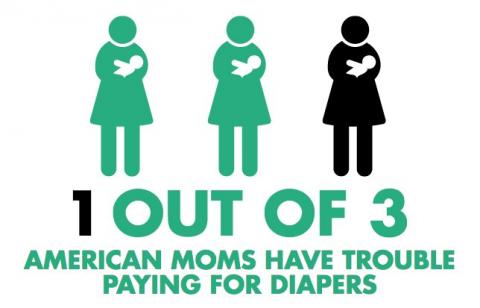
Fact of the Week: 1 in 3 Moms Struggle to Pay for Diapers
Everyone knows babies go through a lot of diapers. But for low-income families, the cost of diapers often forces them to go without another necessity, like food or heat. For many, it can force them to leave babies in soiled diapers longer than they’d like. This can lead to physical and mental health problems for the baby, and can lead to mental health issues for the caregivers, too.
A lack of enough diapers also means low-income working parents who are lucky enough to have child care often can’t take advantage of it because child care centers require providing enough diapers for the infant for the day.
This diaper gap was the focus of an event on Capitol Hill earlier this month, sponsored by the National Diaper Bank Network. Their mission is to raise awareness of diaper need, strengthen community-based diaper banks, and generate donations of dollars and diapers, so that all babies remain clean, dry and healthy.
The briefing was part of the National Diaper Bank Network's lobbying event, where supporters pushed for the passage of the Hygiene Assistance for Families of Infants and Toddlers Act. The bill, introduced by Rep. Keith Ellison (D-MN) and Rep. Rosa DeLauro (D-CT), would provide grants to states that create programs to cover diapers.
Disposable diapers can cost $70-$80 per month per baby. And low-income families in America spend twice as much as higher-income families for diapers, because they can lack transportation to big box stores, the cash or credit to buy diapers in bulk at cheaper prices, and/or the technology to be able to order diapers online and receive deliveries from online subscription services. This all adds up to the fact that families in the bottom fifth of the income ladder with infants spend 14 percent of their income for diapers alone.
Despite this, there is currently no federal assistance for purchasing diapers. Diapers can’t be paid for with food stamps, and programs like WIC don’t help with diapers either. The President’s budget called for $10 million to test effective ways to get diapers to families in need, but Congress doesn’t seem to be chomping at the bit to act on this anytime soon.
That’s why the White House in March announced a partnership between online retailer Jet, diaper manufacturer First Quality and nonprofits like members of the National Diaper Bank Network to provide free diapers to families in need. President Obama gave an update on the progress of this Community Diaper Program initiative in a Mother’s Day blog post, noting that millions more diapers have been given to low-income families. TV comedian Samantha Bee also brought attention to the problem with this piece that aired in April.
The Community Diaper Program is very much needed and very much welcome. But more work remains. If we believe our children are the future of our country, we need to do better at providing them – and their parents – with this most basic need.
For more on the Community Diaper Program, check out this video.
This post was originally published on the Coalition on Human Needs' blog, Voices for Human Needs. Receive similar articles in your inbox by subscribing today, and follow CHN on Facebook and Twitter.



The views and opinions expressed in this post are those of the author(s) and do not necessarily reflect those of MomsRising.org.
MomsRising.org strongly encourages our readers to post comments in response to blog posts. We value diversity of opinions and perspectives. Our goals for this space are to be educational, thought-provoking, and respectful. So we actively moderate comments and we reserve the right to edit or remove comments that undermine these goals. Thanks!